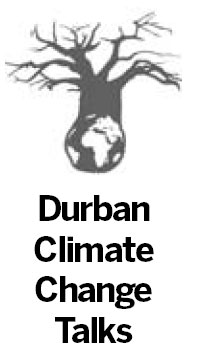EU terms for Kyoto extension unfair: Chinese negotiator
Updated: 2011-12-01 08:19
By Li Jing (China Daily)
|
|||||||||
 |
DURBAN, South Africa - The European Union's conditions to sign up for a second commitment period of the Kyoto Protocol are "not fair" for developing countries, but China is open to negotiation, Su Wei, the nation's leading climate negotiator, said on Wednesday.
The Kyoto Protocol, agreed in 1997, is the only international treaty that sets binding greenhouse gas reduction targets for industrialized countries. Its first commitment period expires in December 2012.
The United States never ratified the Kyoto Protocol, while China and India, as developing countries, are not obliged to meet binding emission reduction targets. Japan, Canada and Russia have already rejected extending the treaty.
Extending the protocol still remains the most contentious issue at the ongoing climate talks in Durban.
The EU said it will only extend targets under the protocol provided there is a timetable for negotiating a single legally binding instrument joined by China and the US after 2020, and it wants the deal to be reached by 2015.
"The new conditions are already beyond the mandate agreed in previous talks, namely the Bali Roadmap agreed in 2007," Su said.
"I think the EU is just shifting the goal posts from one place to another," he added.
"This is actually not an efficient way to do things, because we need to accomplish the goals one by one."
The EU is the only group of countries that would seriously consider a second commitment period under the Kyoto Protocol, and developing countries are also open and ready to talk to them about how to address that issue, said Su.
"(We hope) to secure a really effective and legally binding second commitment period of the Kyoto Protocol," he said, calling the international treaty a "cornerstone of the whole climate regime".
But Su ruled out claims in some media reports that China would make legally binding commitments in Durban.
"China is ready to talk but the post-2020 targets are not on the agenda here in Durban. And I don't want to prejudge the outcome of future negotiations," he said.
Meanwhile, Canada's potential pullout from the Kyoto Protocol will definitely deal another heavy blow to the ongoing climate talks, said Su.
Canadian Minister of the Environment Peter Kent, refused to "confirm or deny" the rumor that Canada had already decided to withdraw from the Kyoto Protocol, only saying it was "an option".
"The news comes at a time when a lot of uncertainties still exist regarding the future of the Kyoto Protocol. It will make its prospects even more gloomy," said Su.
Negotiations on the Kyoto Protocol may also determine the fate of the lucrative carbon market, as developing countries may refuse to sell carbon credits generated under the Clean Development Mechanism (CDM) to those nations who refuse to join the second commitment period of the Kyoto Protocol, he added.
Since 2005, the UN has issued nearly 400 million certified emissions reductions to Chinese CDM projects, of which EU companies have bought the majority to help meet caps under the EU emissions trading scheme.
"The market mechanism was designed under the Kyoto Protocol to help developed countries implement their emission reduction targets in the first commitment period," he explained, "so if there is no target, why have a CDM?"











